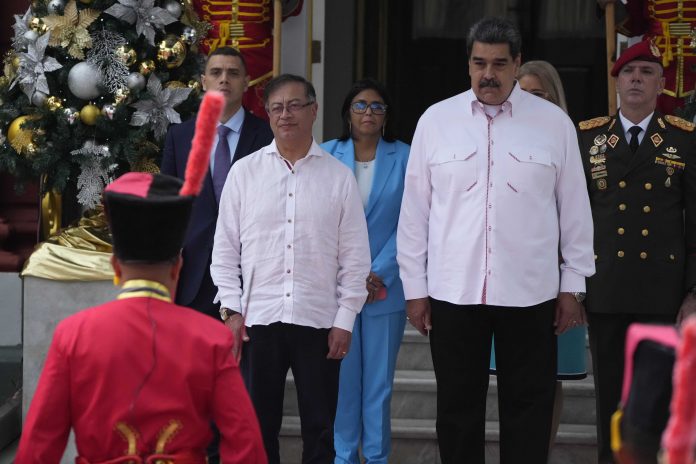
By MANUEL RUEDA undefined
BOGOTA, Colombia (AP) — The presidents of Colombia and Venezuela met on Tuesday and said they would improve trade and security cooperation, as both countries seek to normalize relations following the election of Colombia’s first leftist leader.
After the meeting in Venezuela’s presidential palace, Colombian President Gustavo Petro said it was “suicidal” for the governments of Venezuela and Colombia to have become estranged from each other recently, adding that the border between the countries had been forgotten and “turned over” to criminal mafias.
Colombia’s president said both countries would now look for ways to share intelligence on drug trafficking groups, and added that he would lobby for Venezuela’s re-entry into the Andean Community of Nations, a regional trade and investment group that Venezuela withdrew from in 2006. Petro has asked for Venezuela’s support in peace talks with the National Liberation Army, or ELN, a Colombian rebel group that operates on both sides of the border.
Petro’s efforts to engage with Venezuela’s socialist government mark a radical departure from Colombia’s recent policy: Before Petro was elected in June, Colombia backed U.S. efforts to isolate Maduro’s government, sanction its oil exports and force Maduro into holding free and fair elections.
The United States, Colombia and dozens of other countries stopped recognizing Maduro as Venezuela’s legitimate leader in 2019, after he won an election that was widely seen as undemocratic and backed a claim to Venezuela’s presidency by the former National Assembly leader Juan Guaidó.
Petro changed course as soon as he was sworn into office and re-established diplomatic ties with the Maduro government. On Tuesday opposition leaders in Venezuela criticized Petro’s meeting with Maduro, with Guaidó tweeting that Petro was helping to “normalize” the violation of human rights in Venezuela by “visiting dictator Maduro and calling him a president.”
The International Criminal Court is currently investigating Maduro’s government for human rights violations that include the torture and arbitrary detention of protesters in 2017. In a recent letter addressed to Petro, Human Rights Watch pointed out that there are still more than 240 political prisoners in Venezuela and asked Petro to seek concrete human rights commitments from the Maduro administration as both nations re-establish diplomatic and military ties.
The watchdog group added that military cooperation with Venezuela should be banned until Venezuela security forces stop backing drug traffickers and rebels. Evidence collected by Human Rights Watch and a U.N. Fact Finding Mission suggests that Venezuela’s military conducted joint operations with the ELN last year to root out another rebel group and allowed them to take over gold mines in eastern Venezuela.
Following the meeting Maduro said that he had listened to Petro’s proposals and was also interested in developing a deal between both countries to produce fertilizer, which has become more expensive for many countries in Latin America, due to the war in Ukraine.
“It was an intense, fruitful and extensive meeting” Maduro said.



















